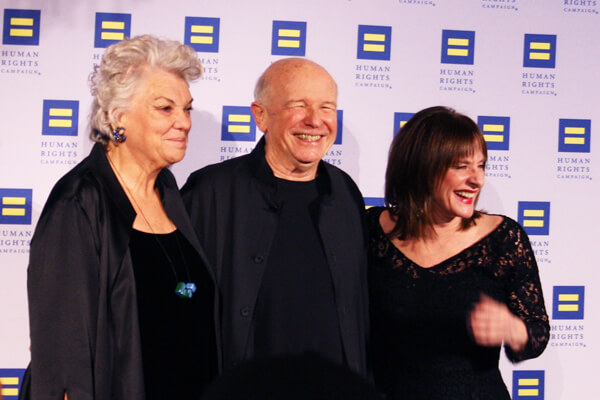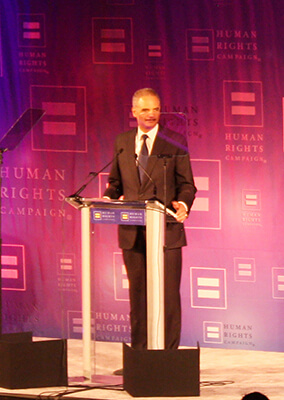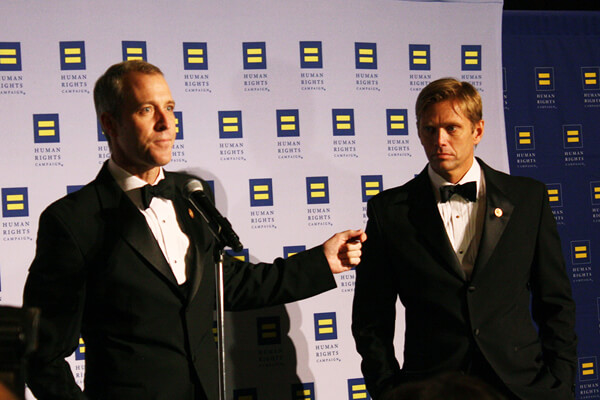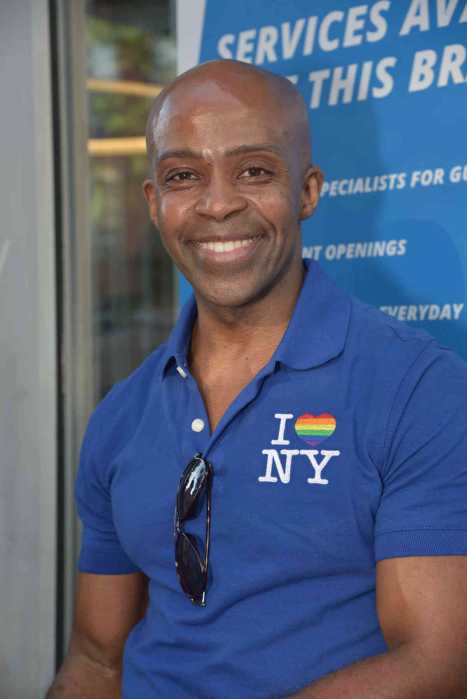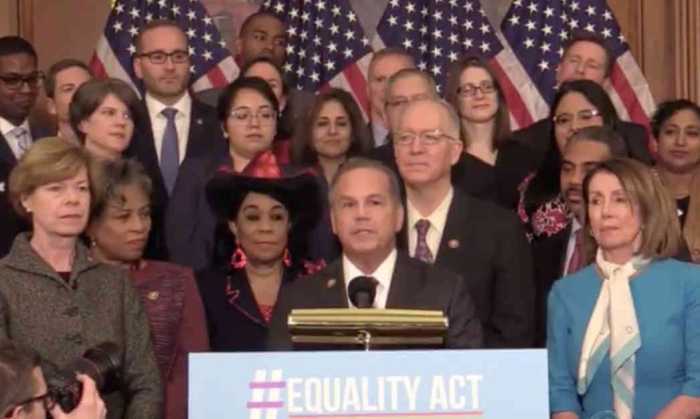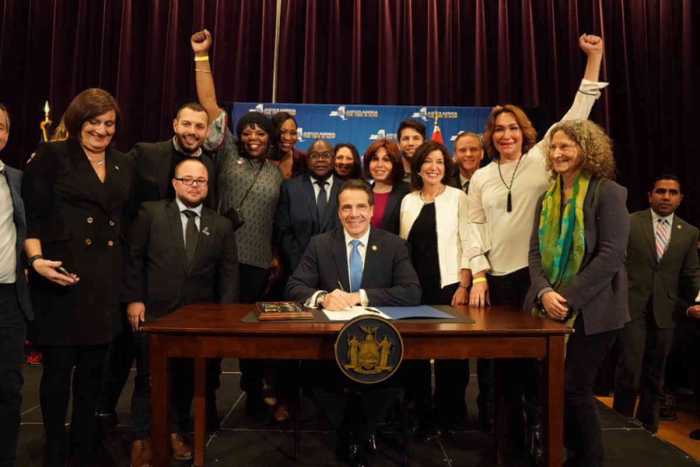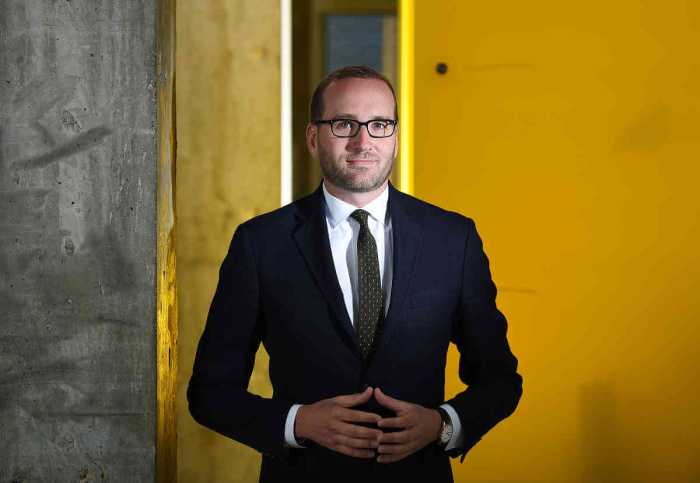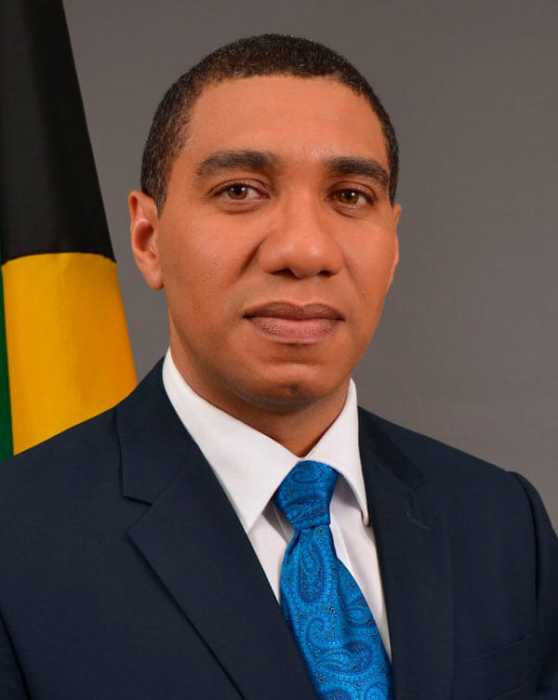US Attorney General Eric Holder used the occasion of an address to the Human Rights Campaign’s annual New York City gala to announce a number of new Justice Department policies expanding on the federal government’s efforts to ensure that married same-sex couples have the same rights as different-sex couples.
At the February 8 dinner at the Waldorf-Astoria Hotel, Holder said that members of same-sex couples will have the right to decline testifying against their spouse in criminal and civil court proceedings, they will be treated just like different-sex couples in bankruptcy proceedings, inmates will be eligible for spousal visits from a same-sex spouse and have the right to furloughs for a spousal emergency or death, and same-sex spouses will be able to participate in federal benefit programs such as the September 11th Compensation Fund and the Public Safety Officers’ Benefits Program, which grants compensation after the injury or death of a public safety officer.
These changes, to be spelled out in a February 10 Justice Department memorandum, are part of a government-wide response since last June’s Supreme Court ruling that struck down provisions of the federal Defense of Marriage Act barring federal recognition of legal same-sex marriages.
Although the Obama administration, and Holder’s Justice Department in particular, moved aggressively after the June 26 DOMA ruling to see that federal agencies accorded appropriate recognition to legal same-sex marriages, Holder’s speech billed the changes he was announcing as big news. The New York Times, relying on excerpts released by the DOJ hours ahead of the speech, ran a story published before the dinner opened with the headline “More Federal Privileges to Extend to Same-Sex Couples.”
Holder, in prefacing the details of the memorandum to come, reviewed earlier LGBT rights advances during the Obama years –– including enactment of a federal hate crimes law and reauthorization of the Violence Against Women Act, both of which were LGBT-inclusive, the repeal of the military’s Don’t Ask, Don’t Tell policy, and the Justice Department decision, 28 months ahead of the Supreme Court’s DOMA ruling, that it would no longer defend the 1996 law against court challenges.
“For President Obama, for me, and for our colleagues at every level of the administration, this work is a top priority,” he said, summarizing that progress.
The attorney general also noted that administration actions since the DOMA ruling had already extended spousal benefits to federal employees in same-sex marriages, recognized gay marriages for federal taxes purposes, and ensured that same-sex immigrant spouses of American citizens can gain permanent residency and citizenship on the same basis as different-sex spouses.
Still, Holder listed the new policies to be implemented in ringing terms.
“In every courthouse, in every proceeding, and in every place where a member of the Department of Justice stands on behalf of the United States –– they will strive to ensure that same-sex marriages receive the same privileges, protections, and rights as opposite-sex marriages under federal law,” he said.
The attorney general emphasized a key element of the Obama administration’s response to the DOMA ruling –– that wherever possible, the federal government will look to the state where a same-sex couple married as opposed to where they live in determining their eligibility to have their marriage recognized, which means that such recognition is not limited to the 17 states that currently allow same-sex couples to marry.
Holder also noted that the DOJ last month announced that, contrary to the policy of the State of Utah, it would recognize the same-sex marriages that state allowed in late December and early January before the US Supreme Court placed a stay on a federal district court ruling there, pending appeal.
The attorney general closed his speech by linking the struggle for gay rights to the history of the battle for African-American equality and challenged the audience to see the two causes as one. Evoking the enactment of the Civil Rights Act of 1964 a half century ago and the tenure of Attorney General Robert F. Kennedy, who later served New York as its US senator, Holder said, “This administration, this Department of Justice –– and this attorney general –– will never stop fighting to ensure equal protection. We will never rest in our efforts to safeguard the civil rights to which everyone in this country is entitled. And we will never waver in our determination to build on the progress we’ve seen –– and bring about the changes our citizens deserve. But you must be our partners in this effort. Everyone in this room, and everyone in the LGBT community, must be committed to ending all discrimination –– discrimination based not only on sexual orientation, but also on race, gender, ethnicity, and national origin. You must be active in those areas of the struggle as well.”
HRC responded enthusiastically to Holder’s appearance. In a written release, Chad Griffin, the group’s president, comparing the attorney general to Robert F. Kennedy, said, “This landmark announcement will change the lives of countless committed gay and lesbian couples for the better. While the immediate effect of these policy decisions is that all married gay couples will be treated equally under the law, the long-term effects are more profound. Today, our nation moves closer toward its ideals of equality and fairness for all.”
Holder’s lofty rhetoric in spelling out new steps in a process well underway for the past seven months came in contrast to his silence on an issue in which the administration is facing increased pressure from LGBT advocates –– the demand for a presidential executive order requiring contractors doing business with the federal government to have nondiscrimination employment policies protecting LGBT workers. The community’s impatience on that issue –– based on the bleak prospects that the long-stalled Employment Non-Discrimination Act can get a vote in the Republican-controlled House of Representatives –– was reinforced by Obama’s recent decision to use precisely the same mechanism to increase the wages of government contractors’ employees to $10.10 in the face of the GOP’s resistance to raising the minimum wage, currently languishing at $7.25.
When Chuck Schumer, New York’s senior US senator, spoke later in the gala’s program, he “urged” the president to issue to such an order regarding nondiscrimination, which he said would affect as many as 16 million workers.
Currently, 29 states offer no private sector employment protections for LGBT workers. Another six, including New York, provide only protections based only on sexual orientation, not gender identity.
In his remarks, Schumer also talked about the controversy surrounding the Olympic Games in Sochi, Russia, in light of that nation’s recent crackdown on gay expression and the wave of anti-LGBT violence that followed. The senator endorsed the Principle 6 Campaign, which seeks to highlight a provision of the International Olympic Committee’s Charter stating, “Any form of discrimination with regard to a country or a person on grounds of race, religion, politics, gender, or otherwise is incompatible with belonging to the Olympic Movement.”
In a letter earlier in the week to Olympic Committee president Thomas Bach, Schumer wrote, “The Principle 6 campaign uses the language of the Olympic Charter to give athletes and fans –– and organizers –– a way to speak out against this discrimination without breaking Russian anti-gay laws or violating the Olympic ban on political speech.” As the Games opened in Sochi, Google, for several days, quoted from Principle 6 on its homepage, which also included illustrations of athletes set against a rainbow pattern.
HRC’s Griffin, in dinner remarks prior to his introduction of Holder, also touched on Sochi as well as anti-LGBT laws and court decisions that have come out of other countries –– including Uganda, Nigeria, Cameroon, and India –– in recent months. At the same time, he emphasized that even in the US progress on equality has had patchwork results. In the immediate aftermath of the DOMA ruling last summer, Griffin embarked on a “Two Americas” tour of Southern and Midwestern states that offer no legal protections for their LGBT residents.
Other highlights of the evening included interior designer Nate Berkus’ presentation of an Ally for Equality Award to Architectural Digest editor-in-chief Margaret Russell and a similar award bestowed on Broadway star Patti LuPone by fellow actor Tyne Daly and playwright Terrence McNally.
Murray Bartlett and Frankie Alvarez, two of the stars of HBO’s new gay series “Looking,” made a brief appearance on stage, but they were not joined by the show’s best known cast member, Jonathan Groff (“Spring Awakening,” “Glee”), who had been scheduled as well.
Holder’s appearance included one gaffe that left many in the audience puzzled. The attorney general acknowledged the presence of Schumer as well as two members of New York’s House delegation –– Sean Patrick Maloney, the upstate Democrat who is New York’s first out gay US representative, and Manhattan Democrat Carolyn Maloney. In mentioning Carolyn Maloney, Holder spoke glowingly of her contributions in Washington, which he said would be missed when she retires at the end of the year. Unfortunately, he had the wrong Carolyn –– it is Long Island Democrat Carolyn McCarthy who plans to leave Congress at the end of this term.

